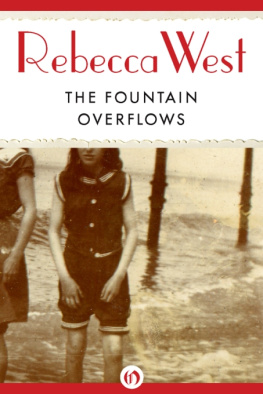The Strange Necessity
Rebecca West
CONTENTS
I
I SHUT the bookshop door behind me and walked slowly down the street that leads from the Odon to the Boulevard St. Germain in the best of all cities, reading in the little volume which had there been sold to me, not exactly pretentiously, indeed with a matter-of-fact briskness, yet with a sense of there being something on hand different from an ordinary commercial transaction: as they sell pious whatnots in a cathedral porch. Presently I stopped. I said Ah! and smiled up into the clean French light. My eye lit on a dove that was bridging the tall houses by its flight, and I felt that interior agreement with its grace, that delighted participation in its experience, which is only possible when one is in a state of pleasure.
I was pleased by a poem that I had just read; the following poem:
ALONE
The moons grey-golden meshes make
All night a veil,
The shore lamps on the sleeping lake
Laburnum tendrils trail.
The shy reeds whisper to the night
A nameher name
And all my soul is a delight,
A swoon of shame.
It may seem inconceivable that this poem should bring pleasure to any living creature, for as art is in part at least a matter of the communication to the audience of an emotion felt by an artist, this is plainly an exceedingly bad poem. And all my soul is a delight, a swoon of shame are words as blank as the back of a spoon. Nevertheless this poem gave me great pleasure, because I had considered it in the light of its authorship. For it is not the words to a song, it is not by Mr. Fred E. Weatherley. It is not by Miss Helen Wills, whose sole poetical production (published, I think, in Vanity Fair ) it very closely resembles. It is, on the contrary, as one might say, by Mr. James Joyce. It is one of the poems, and not noticeably the worst, included in the collection he has called Pomes Penyeach. And because he has written it I was pleased, though not at all as the mean are when they find that the mighty have fallen, for had he written three hundred poems as bad as this his prose works would still prove him beyond argument a writer of majestic genius. Indeed, the pleasure I was feeling was not at all dependent on what my conception of Mr. James Joyce is: it was derived from the fact that, very much more definitely than five minutes before I had a conception of Mr. James Joyce. Suspicions had been confirmed. What was cloudy was now solid. In those eight lines he had ceased to belong to that vast army of our enemies, the facts we do not comprehend; he had passed over and become one of our friends, one of those who have yielded up an account of their nature, who do not keep back a secret which one day may act like a bomb on such theory of the universe as we may have built for our defence.
For really, I reflected, as I went on my way down the Street of the Seine, this makes it quite plain that Mr. James Joyce is a great man who is entirely without taste. So much is proved by the preservation of this poem against considerable odds, for it was written at Zurich in 1916, and there was the removal to Paris, there were eleven years, there was space and there was time, in which to lose it. And lack of taste, when one comes to turn over the handicap he has laid on his genius, is the source of nearly all of them. It explains, for example, the gross sentimentality which is his most fundamental error. What do I mean by sentimentality? I had to think. There appeared before my eyes another part of France, the Provenal village where I spend my summers, the crook in the high street where the men sit at little tables with heads bent sideways and downwards as if they all had stiff necks, watching the game of boules that incredibly goes on, parting and reassembling as the automobiles fly past, in the puddle-pocked, wheel-harassed roads. It is not a likeable game. It brings two kinds of unpleasantness to the ear, for when the boules meet the spurting sound of their impact is like an exchange of rude remarks, and when they meet only with a little force, as must often happen in a game played on such a surface, that sound has the futile quality of feeble rudeness, of failure in an enterprise where even success would have meant nothing pleasant. And there comes from the onlookers never that tense yet languid cry, only a little more than a deep breath, which tells that a crowd is participating through attention in the deep peace of a beautiful movement: instead came praising, blaming Ohs! and Ahs! which show that they are not resting, that in this pastime there has not been lifted from them the human burden of discrimination and calculation, that load of pricking needles. It is, therefore, better as one passes to raise ones eyes to the great umbrella pine which is the steady roof to all the squint-sitting people, making out of a hundred branches, a million twigs, a form as single as a raindrop, casting a shadow as of an undivided substance. It had seemed to me that the men squatting at their boules were like the sentimental artist, that the pine-tree was like the non-sentimental artist.
For the non-sentimental artist has an intention of writing a book on a theme which is as determined and exclusive as the trees intention of becoming a tree, and by passing all his material through his imagination and there experiencing it, he achieves the same identity with what he makes as the growing tree does. Now neither tree nor artist has eyes, neither has ears, neither is intelligent: simply they are becoming what they make. The writer puts out his force and it becomes a phase of his story, as the tree puts out its force and makes a branch. Both know how much force to put out, and where next to reassert it, because having achieved this identification with their creation they would feel a faulty distribution of balance as one would a withered limb. Since that which was made first wandered in the path of its making, as things created from the real elements do, like veins and rivers, the second exercise of force cannot be arranged according to a mechanical symmetry, but must balance irregularity with irregularity, and again the artist who has identified himself with his theme feels this as almost automatic an adjustment as a movement of his own body. In La Princesse de Clves, in Adolphe, in the pages of Stendhal, there is established a perfect equilibrium, there are no patches or pages or chapters that are notably better or worse than the rest (though there are, of course, climaxes dictated by the theme); there is no character which is not displayed in the right extent of space with the right degree of emphasis, because each writer has passed the theme and its characters through the imagination and knows the value of each character as one knows the weight of an object one has held in ones hand; there is no part which rebels against the whole, there is the peace of unity.
But the sentimental artist is becoming nothing, he has ears, he has eyes, he is being intelligent, he is playing a game, he is moving certain objects according to certain rules in front of spectators. Those objects one may take as the isolated units of his material which he has passed through his imagination by an unfortunately discontinuous process. He sees that one of those objects occupies a certain position on the ground, and knows that he will score a point if he can remove it to another position; he therefore sends another of these objects rolling along to displace it. Shock one hears that ugly sound. Often one hears it in the uglier form produced by weak impact, for this method presents more hazards than real creative writing. To communicate ones experience to an audience is no trouble to an artist, since in point of fact giving formal expression to a work of art is to interpret ones experience to oneself, so that one merely permits the audience to look over ones shoulder. But to condition the expression of ones experience out of regard for the effect on ones audiences mind is to bring into the artistic process a factor so little of a constant, since that mind is perpetually changing according to the social and intellectual movements of the time, and ones understanding of it is as unstable, that it is comparable to playing bowls on a highroad.















